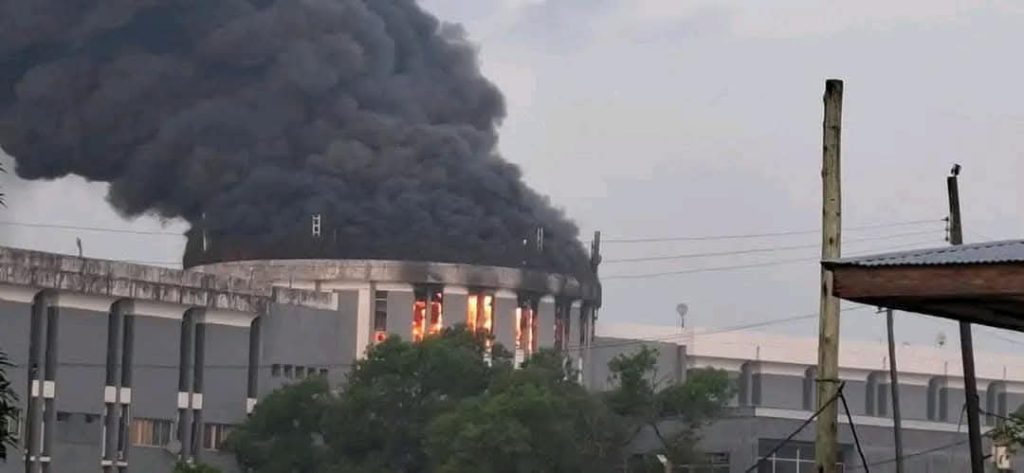The December 18, 2024 arson attack on Liberia’s Capitol Building has sparked widespread outrage and calls for accountability. This act of violence, targeting the very heart of the nation’s democracy, has been condemned by peace-loving Liberians who see it as a dangerous escalation of political tensions and a blatant disregard for the rule of law. The incident has highlighted the urgent need to address the underlying issues of impunity and political instability that threaten to undermine Liberia’s fragile democratic progress. Bringing the perpetrators to justice is not only crucial for deterring future attacks but also for sending a clear message that such acts will not be tolerated.
The arson attack occurred amidst a period of political turmoil within the Liberian Legislature, specifically centered around the removal of Speaker J. Fonati Koffa. A faction of lawmakers, opposed to Koffa’s leadership, had mobilized protests and engaged in disruptive behavior within the Capitol Building in the weeks leading up to the fire. This included the removal of furniture from the joint chamber and the use of tear gas during legislative sessions. These actions, indicative of a growing disregard for democratic processes and institutions, created a volatile environment that ultimately culminated in the arson attack.
The Liberia National Police, in collaboration with other agencies including the Liberia National Fire Service, the Environmental Protection Agency, and the Liberia National Petroleum Company, conducted an investigation into the fire. Their findings confirmed that the incident was indeed a deliberate act of arson. While foreign experts were also invited to contribute to the investigation, the preliminary conclusion of arson pointed towards a calculated and malicious intent. This confirmation further fueled public demands for those responsible to be held accountable.
The political context surrounding the arson attack is crucial to understanding its significance. The ongoing power struggle within the legislature, fueled by disagreements over Speaker Koffa’s leadership, had created a climate of tension and instability. The actions of certain lawmakers and their supporters, including disruptive protests and acts of vandalism within the Capitol Building, had already eroded respect for democratic norms. The arson attack represented a dangerous escalation of this conflict, demonstrating a willingness to resort to violence and destruction to achieve political ends.
In the aftermath of the fire, the Liberia National Police arrested 73 individuals who had participated in an anti-government demonstration at the Capitol a day before the incident. Among those arrested were Representative Frank Saah Foko, who had publicly announced his intention to attend legislative proceedings accompanied by his supporters. Security officers on duty the night of the fire were also detained as persons of interest. These arrests signaled the authorities’ commitment to investigating the incident and holding those responsible accountable.
The arson attack on the Capitol Building serves as a stark reminder of the fragility of Liberia’s democracy. The incident underscores the dangers of political instability and the importance of upholding the rule of law. The calls for accountability are not merely demands for punishment but also reflect a broader desire to strengthen democratic institutions and prevent future acts of violence. Holding the perpetrators accountable is essential for restoring public trust in the government and ensuring that such attacks do not become a recurring feature of Liberia’s political landscape. The severity of the crime necessitates a thorough and transparent investigation, followed by appropriate legal action against those found responsible. This is not just about punishing individuals; it is about safeguarding the future of Liberia’s democracy.
The incident highlights the urgent need for political leaders to prioritize dialogue and compromise over confrontation and violence. It also emphasizes the importance of fostering a culture of respect for democratic institutions and processes. The arson attack should serve as a wake-up call for all stakeholders in Liberia’s political system to work together to strengthen the nation’s democratic foundations and prevent such acts of violence from ever happening again. The future of Liberia’s democracy depends on it. Any individuals found to be involved in the arson, especially if they hold public office, should face the full consequences of their actions. This includes not only criminal prosecution but also potential disqualification from holding future public office. Such measures are necessary to deter future acts of violence and uphold the integrity of Liberia’s democratic institutions. The rule of law must apply equally to all, regardless of political affiliation or position. This is the only way to ensure that Liberia’s democracy can thrive and that the voices of its people are heard and respected.














